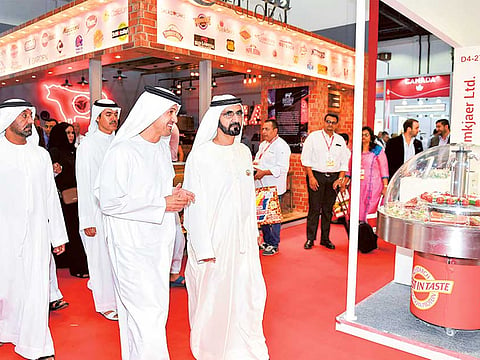CEO argues for globally accepted halal standards
Al Awar was speaking at a forum on the future of halal food, organised around Gulfood 2017

DUBAI
The keynote speaker at an industry platform aimed at shaping the future of halal food and beverages has stated that his government agency’s key objective for the next four years is to “establish a conducive ecosystem for the development of halal trade, including globally accepted Halal standards.”
Abdullah Mohammad Al Awar, CEO of Dubai Islamic Economy Development Centre, made the comments on Monday morning at an event taking place on the sidelines of the Gulfood 2017 expo, being held this week at Dubai World Trade Centre.
In his speech, Al Awar outlined his organisation’s two other key objectives for the period 2017-2021: “Firstly, to increase the global trade volume of Halal products; and secondly, to consolidate the status of Dubai and the UAE as a prime destination and global reference for international halal companies.” Halal means legal or allowed under Islam.
The gathering was hosted by the Emirates Authority for Standardisation and Metrology (ESMA), the body responsible for providing approval to halal products, including food and cosmetics.
Setting a global halal standard has long been a goal of the UAE, and in May 2016 the country moved a step closer to achieving their aim.
Nine nations, including Saudi Arabia, Egypt, Australia, New Zealand, Pakistan, the United States, the United Kingdom and Spain signed a memorandum of understanding on May 6 to establish the International Halal Accreditation Forum, based in Dubai.
The CEO called on countries to ensure a healthy sustainable future for the food industry by using halal practices, saying that “food safety, food production and food security are on top of the agenda for the human race.”
By 2019, the halal market is expected to have reached $3.7 trillion (Dh13.6 trillion) globally, an increase of 10.8 per cent a year, according to a Global Islamic Economy Report released in February 2016.
Describing halal as a more responsible approach and ethical practice, Al Awar went on to highlight that “today, Dubai is hosting experts and manufacturers from western countries that have become leaders in the halal food industry.”
“They know that Dubai and the UAE have much to offer to make the halal industry a major contributor to social and economic development,” added Al Awar.
According to the report, the top countries for halal food consumption are Indonesia, with a market worth $190 billion, Turkey, where the market is valued at $168 billion, Pakistan at $108 billion and Iran, with a market of $97 billion, based on 2013 data.
Meanwhile, Malaysia, the UAE and Australia lead the report’s Halal Food Indicator, a gauge that focuses on the health of the country’s halal food ecosystem in relation to its size.



